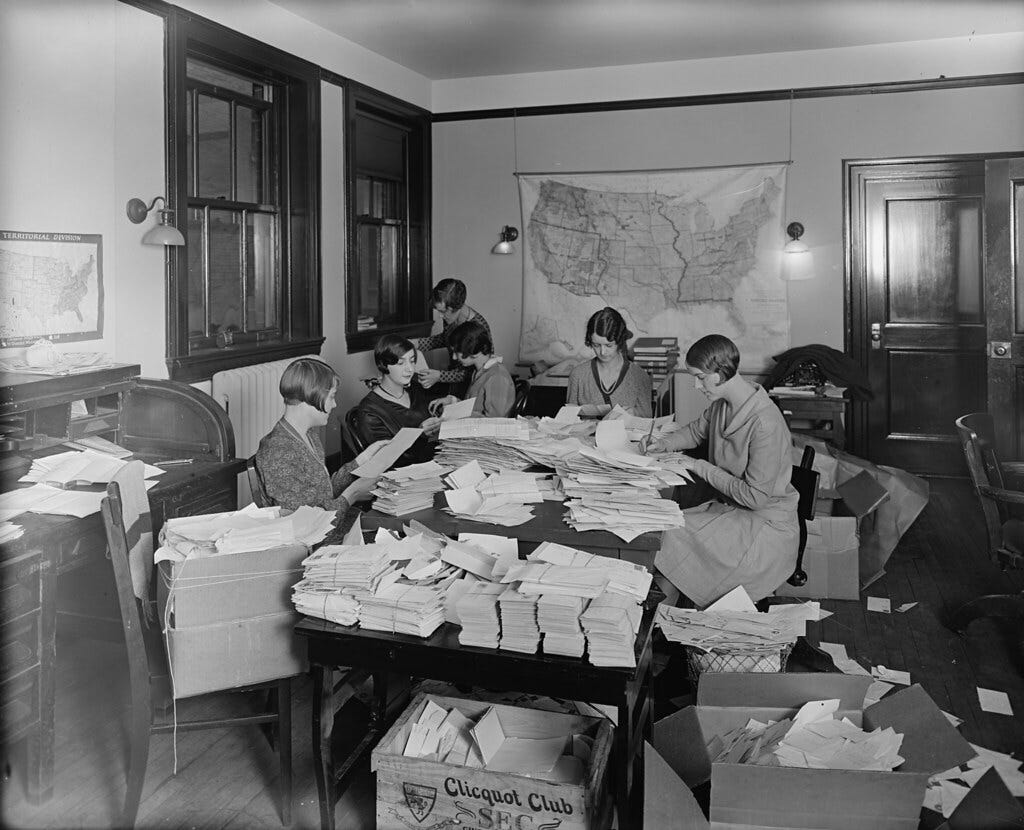Tim Nesbitt: Democracy’s best days ever are still to be achieved
What Oregon contributed to, and can learn from, Voting’s Best Days Ever in the History of Our Republic.
Tim served as Chief of Staff for Gov. Kulongoski. A former union leader, he lives near Independence and oversees a specialty apple orchard.
Another election winner? Voting.

Along with Joe Biden and Kamala Harris, the big winner in this election was voting itself. These were voting’s best days ever in the U.S., as measured by the participation of all citizens.
Oregon’s innovations are part of this story. Here, mailed ballots are standard issue. Voting spans more than two weeks. And last-in ballots are treated with the same respect and legitimacy as those that precede them. We’ve got this voting thing down. But we had to watch from afar as other states lived through a steep learning curve in the conduct of democracy.
I was fearful of how the presidential election would play out in the battleground states. Then my fears turned to fascination. Live streams of vote counting rooms. Videos of elderly poll workers staring down crowds of shouting protesters. And interviews with secretaries of state defending their voting systems with eloquence, conviction and aplomb. No candidate gets to stop the count, they told us. No political party gets to declare the result. Americans heard that and, for the most part, accepted it. This was a lesson in democracy worth far more than a high school civics course.

It is traditional for winning candidates to thank the voters. But it was unusual for a president-elect to call out those who made the process work, as Biden did when he thanked “all those who volunteered, worked the polls, local election officials” in his victory speech. The very process of voting has appreciated in stature and celebrity. More Americans vote now and will continue to do so. More young people see it as an exciting rite of passage. More people of color have experienced it as a path to the perfection of our founding principles. They will not be denied in future elections.
Vote by mail had a supporting role in this docudrama. Oregonians like former Secretary of State Phil Keisling and organizations like the League of Women Voters deserve credit for pioneering our method of voting with the passage of Measure 60 in 1998. It’s now being called VAH – vote at home, which turned out to be well-suited to the constraints forced on us by the pandemic. By any name, it can be added to the list of reforms first tested and perfected in our state. We should feel good about our record as a laboratory of democracy as VAH claims a safe and secure role in other states’ elections.
No bragging rights when it comes to governing
But we can’t claim any bragging rights when it comes to how we govern ourselves. The actions of the mob that attacked Portland Commissioner Dan Ryan’s residence after his vote to protect the city’s police budget last week were appalling. As were the actions of those who hijacked the peaceful Black Lives Matter demonstrations earlier this year, trashing not only storefronts but the legacy of nonviolent protest. Ditto for those who showed up at the State Capitol to harass racial justice protesters in Salem and the pickup truck marauders who launched paint balls at bystanders in Portland.
I may be guilty of “both side-ism” here (more on that below), but I’d say that we, like the nation, have some craziness in our midst, in the far fringes of left and right.
Still, I was encouraged by two random acts of reasonableness I observed in the days after the election. Small things, but worth mentioning.
First, there was the discussion on OPB’s Think Out Loud about the merits of Measure 110, the addiction treatment and decriminalization measure that made headlines as a first-in-the-nation response to the failure of our drug laws. On one side was Multnomah County DA Mike Schmidt, who supported the measure; on the other side was Washington County DA Kevin Barton, who had opposed it. They shared their thoughts about what to expect from the measure’s implementation. And, when host Dave Miller asked Barton what it would take for him to change his mind about the measure, Barton answered honestly. He didn’t posture or call for repeal. He said he’d judge the measure by what it accomplishes, as measured by reductions in the rates of addiction and property crimes. By those metrics, Barton said, he hoped the measure would succeed. That was a thoughtful response to a rejection by the voters that is all too rare in today’s environment.
Second, there were Cheri Helt’s comments about President Donald Trump’s post-election rampage. Helt is a Republican legislator from Bend, with whom I’ve worked on school funding and PERS reform in the past. She lost re-election last week in a Democratic district. But that didn’t stop her from castigating Donald Trump for his refusal to accept the electoral vote count. “Now is the time for elected Republicans all across America to condemn the President for undermining our democracy with his dangerous rhetoric and NO evidence of election fraud,” she tweeted. “Counting all the votes is not stealing – it’s an election.” As you might expect, she suffered some blowback for her statement, but she responded: “Trump is losing, not from an absurd conspiracy, but because he’s been an extremely divisive President, it’s time for unity.”
Reactions like these are too easily lost in the din of violence and vitriol that can carry over from hard fought election contests. Civility is a quiet virtue that requires honesty and reflection – qualities we tend to self-censor in the heat of a campaign. It’s in the aftermath of elections when the quality of our democracy is tested – not just by whether we accept the results of vote counts, but by whether we learn from them, by listening to and warranting the voices of the other side.
The importance of both sides
I mentioned earlier what’s being dismissively characterized as “both side-ism,” a new target of hard-left ire. Trump tainted this concept in the wake of the Charlottesville protests, when he used it to legitimize as good people a cadre of white supremacists. That was abhorrent. But there’s a form of both side-ism that is essential to democracy – the ability to call out bad behavior on one’s own side and learn from the will of the voters when elections don’t go your way. This is what we saw in the responses of Helt and Barton last week and in the firm denunciation of the violence at Dan Ryan’s house from City Commissioner JoAnn Hardesty, who tried and failed to get Ryan’s vote.
My conclusion from working for decades in both the trenches and the command centers of some intense campaigns is that you learn more from your defeats. To live in a democracy is to recognize that you can’t get all that you want all of the time, nor can you get all that you want even some of the time. Democracy requires compromise within a framework of shared values. Progress comes from the constant re-evaluation of your advances and setbacks and an openness to learn from both.
What’s ahead for Blue Oregon
I expected this to be a blue wave, even a blue tsunami, election in Oregon this year. But it was more like a blue ripple. Trump gained more total votes and a larger vote share than he did here in 2016. Biden outperformed Hillary Clinton by picking up what had been third party votes four years ago. But not much changed. In the midst of an impressive turnout Oregon didn’t get any bluer.
Oregon Democrats claimed 57% of the vote for Biden, for Sen. Jeff Merkley, and for their five Congressional candidates. They also tallied an average of 53% for Democratic candidates for statewide offices. This was notably less than what Democrats tallied in California and a tad behind their performance in Washington State. So we’re not as deep blue as our coastal neighbors.
In the Oregon legislature, Democrats and Republicans fought to a draw. The Republicans’ “flee-a-buster” walkouts of 2019 and 2020 didn’t trouble their voters; in fact, it may have pleased them. As a result, Republicans now hold a more potent veto hand over the legislature than the Governor herself.
So, despite their continuing super-majorities in both chambers of the legislature here, the Democrats in Oregon appear to face the same kind of challenge that Biden and the Democrats face in Washington D.C. It’s not clear how they will handle this and whether the results of the more innovative Oregon Way of voting can set the stage for a more collaborative Oregon Way of governing in the years ahead.
In Oregon, as in the rest of the country, democracy’s best days ever are still to be achieved.
********************************************
Keep the conversation going: Facebook (facebook.com/oregonway), Twitter (@the_oregon_way)
#58




